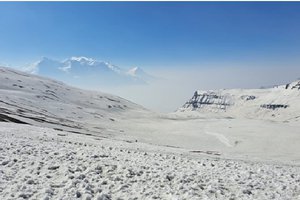Arup Rajouria

2024: A Year Of Missed Opportunities- A Call For Transformative Climate Action In 2025
The failure of COP29, held in Baku, Azerbaijan, concluded with a disappointing agreement that promised at least $300 billion annually in climate finance to developing countries—an amount that is still far from the $1.3 trillion considered necessary by experts for effective climate action.
By Arup Rajouria Dec 31, 2024

Himalayan Meltdown: Threat Beyond Borders
The retreat alters the region’s hydrology and poses an imminent threat in the form of glacial lake outburst floods (GLOFs) where sudden drainage of glacial lakes can unleash a catastrophic flood down streams. Nepal, alone has over 2,700 such lakes - ticking time bombs threatening millions
By Arup Rajouria May 10, 2024

A Cry From The Himalayas: Echoes Of Hope And Compromise At COP-28
After attending many COPs, or Conference of Parties, I have learned over the years that COPs are not about absolute victory or crushing defeat, but rather intricate negotiations where progress can be made, hope can flicker, and the future can inch closer to sustainability.
By Arup Rajouria Dec 21, 2023

Climate Crisis: Can world Leaders Rise to the Challenge ?
President Biden’s likely decision to skip COP28 has further worsened these concerns. The symbolic gesture of the US President’s absence could be interpreted as a weakening of the US’s commitment to addressing human induced climate change.
By Arup Rajouria Nov 17, 2023

Conflict Diverts Attention: How the Hamas Israel Crisis Affects Climate Priorities At COP 28
The escalation of the Israeli-Hamas crisis, with the possibility of wider regional involvement, has the potential to further strain relations within the Middle East and beyond. This strain could severely strain regional and international co-operation on climate solutions, a crucial aspect in addressing human induced climate change
By Arup Rajouria Oct 28, 2023

Urgent Call To Action: Navigating LDC Graduation And Climate Challenges At COP 28
LDCs, despite contributing minimally to climate change, bear the brunt of its devastating consequences due to their vulnerability. Graduation further exacerbates this vulnerability by curbing access to vital international support measures imperative for climate change adaptation and mitigation.
By Arup Rajouria Aug 23, 2023

Nepal's Tiger Success Story: The Inconvenient Truth
Nepal's success in enabling wild tiger populations to recover is part of a wider global push to boost wild tiger populations. According to the International Union for Conservation of Nature (IUCN), there are at least 40 percent more tigers in the wild than there were in 2015.
By Arup Rajouria Aug 08, 2023

Climate Change Loss And Damage: Empowering Low-Income Countries And Redressing Power Imbalances Now
The Melamchi Water Supply Project is a stark example of the risks of large-scale infrastructure projects in mountainous regions like Nepal, where human induced climate change-induced landslides are more prevalent, particularly during the monsoon season. The project was halted after its head works were damaged by a landslide caused by heavy rainfall.
By Arup Rajouria Jul 28, 2023

Climate Change: The Ultimate Test Of Our Time
Here in Nepal, we face our own unique challenges due to human induced climate change. The changing climate in Nepal has already begun to affect various aspects of the country, including water resources, ecosystems, agriculture, and urban areas.
By Arup Rajouria Jul 17, 2023

Climate Change's Impact on South Asia: A Threat to National Security And Foreign Policy
Nepal relies on hydropower for its energy needs, and the country has invested heavily in this sector. However, climate change is impacting water resources and energy security, which could have a significant impact on Nepal's economy.
By Arup Rajouria Jul 12, 2023
Latest Updates
- PM Oli Condemns Terrorist Attack In India
- 1 day, 1 hour ago
- Nepal’s Snow Leopard Population Reached 397
- 2 days, 3 hours ago
- Education Minister Bhattarai resigns from post
- 2 days, 3 hours ago
- Four people died in Taplejung after their vehicle caught fire after getting entangled in a live wire
- 3 days, 2 hours ago
- RPP General Secretary Rana released on bail
- 3 days, 2 hours ago
- Nepal requires Rs 21.165 trillion to implement SDGs goals
- 3 days, 3 hours ago
- RPP Leaders Demonstrated Inside Singhadurbar , Linden Arrested
- 3 days, 20 hours ago
- Foreign Minister Dr. Deuba to head to Bangkok to chair UN Meeting
- 4 days, 2 hours ago
- We Do, What We Say, The Government Will Not Be Afraid: RPP Leader Lingden
- 4 days, 2 hours ago
- Home Ministry warns RPP: Action will be taken if it violates prohibited Areas
- 4 days, 2 hours ago





